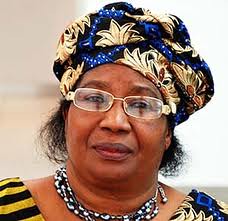
President Joyce Banda of Malawi. She was sworn in after the death of Bingu wa Mutharika who died on April 6, 2012., a photo by Pan-African News Wire File Photos on Flickr.
Malawi cancels AU summit hosting over al-Bashir
Saturday, 09 June 2012 00:00
BLANTYRE/KHARTOUM — Malawi yesterday cancelled its hosting of next month’s African Union summit in a dispute over the bloc’s insistence on inviting Sudanese President Omar al-Bashir who is wanted by the International Criminal Court for alleged war crimes and crimes against humanity committed in Sudan’s Darfur region.
Vice President Khumbo Kachali said the Malawi government had refused to bow to the 54-member group’s condition that Bashir attends the Lilongwe meeting.
“After considering the interests of Malawians, I want to inform Malawians that the cabinet met today and decided it was not interested to accept the conditions by the African Union, therefore Malawi is not hosting the summit,” Vice President Khumbo Kachali told journalists.
The decision had already been communicated to the AU, he said.
Kachali said the country had received a communication from the AU commission that as a host country Malawi was required to invite all the continent’s presidents, including Bashir. The commission said if Malawi was not willing to host al-Bashir, the venue should be shifted to another country,” he said.
Sudan yesterday officially asked the AU Commission to move the AU summit from Malawi after the latter announced that it would not welcome the participation of al-Bashir.
“Sudan on Wednesday filed an official letter to the African Union Commission in which it asked for moving the forthcoming 19th AU summit . . . to the AU headquarters in Addis Ababa,” said Sudan’s Ministry of Foreign Affairs in a statement.
“Sudan has based it on Malawi’s non-commitment to the AU organising laws and regulations which is represented in its announcement not to welcome (the) participation of the President of the Republic in the summit under the pretext that it was committed to the decisions of the so-called International Criminal Court (ICC),” the statement said.
The statement went on to say that, “Sudan sees that Malawi, with this stance, violates what is mentioned in item 5 of the internal procedures of the AU summit which commits the Member States, which host the summit to abide by the standards stated by the AU summit and provide the suitable atmosphere for convening the summit .. . .”
Malawi recognises The Hague-based ICC. President Banda said last month that she wanted Bashir to stay away to avoid straining ties with key donors. Banda has embarked on a major drive to smooth ties with the international community, which were soured under her predecessor Bingu wa Mutharika and has taken a number of bold steps to steer the country into donor-friendly waters.
Foreign aid once provided roughly 40 percent of Malawi’s development budget but funding was slashed amid an economic crisis and governance concerns under Mutharika’s rule.
Under current ICC rules, signatories — which include 33 African states — have a duty to arrest Bashir.
Earlier this week, ICC prosecutor Luis Moreno-Ocampo told the UN Security Council that failure to detain him and other Sudanese officials accused of war crimes and genocide was “a direct challenge to the council’s authority”.
The Sudanese leader is the first sitting president indicted by the court and his visits spark diplomatic headaches for African nations, with some signatories vowing his arrest on their soil while others flout the court’s rules. Malawi was reported to the ICC in December when it refused to arrest al-Bashir after he attended a Common Market for Eastern and Southern Africa summit.
In 2009, the AU said it would not respect the ICC warrant and urged the United Nations to suspend the arrest order. Last month, the foreign minister of Benin, which is the current chair, said the group had no reason to bar Bashir from the summit.
The meeting, meant to end with a heads of state summit from July 15-16, is set to elect a new commission chair after the January deadlock. — AFP/Xinhua.
No comments:
Post a Comment